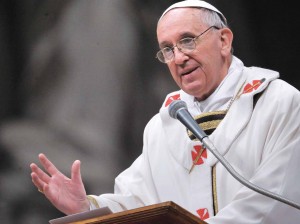Front Row with Francis: Faith, Identity and Cultural Zeal
 This week, Pope Francis continued his Apostolic Visit to Korea where he spent time with youth and Bishops of the country. He shared that his visit can be summed up by three words: memory, hope, testimony.
This week, Pope Francis continued his Apostolic Visit to Korea where he spent time with youth and Bishops of the country. He shared that his visit can be summed up by three words: memory, hope, testimony.
Like all Catholics, I have my own testimony. I am an adult convert to the Catholic Church. In 2012, I came into the faith on Easter Vigil, and still have the same zeal, fervor and excitement for the faith I fought to express. When I shared my new and deeply seated belief to my husband, it came as a great shock. I could imagine that I seemed unrecognizable to a man I shared my life with for years. I didn’t know how to express it then, but Pope Francis, in his Audience noted “Christ does not abolish what is good, but carries it on, and brings it to fruition.”
There is a fear when conversion happens, a fear of the death of one life, who I was prior to conversion, and taking up the cross of another unknown, yet more complete life as I have come to trust. The fear is not only for the converted, but for the people whose path will be changed as a result.
As a Hispanic woman married to a Hispanic man, our cultural identity is important. We promote our culture with our children as something to be proud of and celebrated. Our cultural identity would not change, our traditions would not change, they would be enhanced in ways we couldn’t know, because I was living in the newness of conversion.
In the few short years since my conversion, I have been set free in areas of my life I didn’t know were shackled. I am now the “me” I was always meant to be, the “me” I didn’t know was even a possibility.
In his Apostolic Journey to Brazil in 2007, Pope Benedict XVI spoke about this at Aparecida, when he asked,
Yet what did the acceptance of the Christian faith mean for the nations of Latin America and the Caribbean? For them, it meant knowing and welcoming Christ, the unknown God whom their ancestors were seeking, without realizing it, in their rich religious traditions … Christ, being in truth the incarnate Logos, ‘love to the end’, is not alien to any culture, nor to any person; on the contrary, the response that he seeks in the heart of cultures is what gives them their ultimate identity.
From a cultural perspective, my conversion was very unlikely. An analysis done by Sherri Weddell, in her book Forming Intentional Disciples shared:
Hispanics are much more likely to be non-Catholic if they are born in the United States. Similarly, if their dominant language is English, they are twice as likely to be non-Catholic. If they are second- or third-generation residents of the United States, Hispanics are more likely to convert to Protestantism or leave the Church.” (Kindle Locations 535-538).
I am every single one of those indicators. I was born in the United States, English is my first and dominant language and I am a second generation resident of the United States. I chose to be Catholic. I have always identified with my Puerto Rican culture. I love the music, cook the food and speak the language every day.
Now, I have the saints as a model of faith in my everyday walk with Christ. Specifically, I lean heavily on my vocation as a Lay Dominican sharing the lives of the saints in the Spanish and Latin saints within the Order with my children, an order founded by a Spanish priest, St. Dominic de Guzman.
I also have a special devotion to Our Lady of Guadalupe, an approved apparition of the Blessed Virgin Mary in Mexico. Holidays have taken a special deeper meaning as we now go to mass weekly. The Liturgical Year is now incorporated into the rhythm of our seasons as we share typical feasts and look to Christ to share the meaning of His life and that of His saints and Martyrs.
Pope Francis said it best, when he said:
Christ does not cancel cultures, Christ does not cancel cultures. He doesn’t suppress the progress of the people who, through the centuries and millennia, seek truth and practice love for God and neighbor.
We can look to the Word for further example in Romans 2: 28-29:
“For a person is not a Jew who is one outwardly, nor is true circumcision something external and physical. Rather, a person is a Jew who is one inwardly, and real circumcision is a matter of the heart—it is spiritual and not literal. Such a person receives praise not from others but from God.”
By seeking the love of God in my marriage and in my family, I have been emboldened by, for and with the love of Christ. I have been transformed, yes – soul deep. Those whose lives have crossed mine have been altered. Who I am, my culture and faith have been enriched and will continue to deepen as I walk humbly with the Lord.

